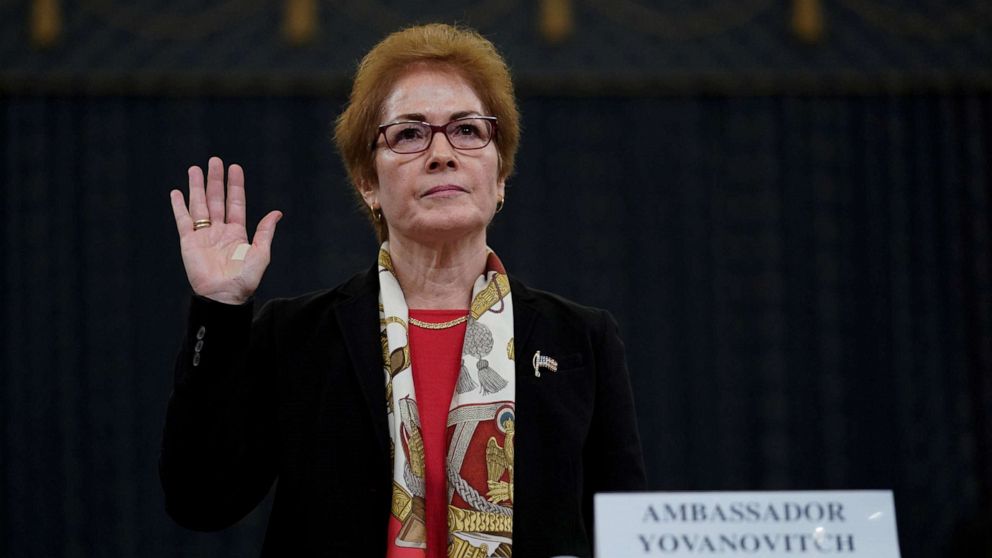Impeachment hearings day 2: Former ambassador to Ukraine describes why Trump recalling her damaged US interests
Marie Yovanovitch, the former U.S. ambassador to Ukraine who was abruptly recalled from her post overseas, is testified Friday in the second public impeachment hearing.
After fielding questions from impeachment investigators behind closed doors last month, she offered details of her account of efforts to publicly discredit her and remove her from her post by some of the president's political allies.
Missed the more than six hours of testimony? Catch up on key takeaways from Friday's hearing and the hearing earlier this week.
Here is how the hearing unfolded.
3:21 p.m.
The hearing has ended, thus capping a week of testimony and foreshadowing the upcoming testimony next week.
On Tuesday morning, Jennifer Williams, Vice President Mike Pence's special adviser for Europe and Russia, will testify alongside Lt. Col. Alexander Vindman of the National Security Council.
On Tuesday evening, former U.S. envoy to Ukraine Kurt Volker, and Timothy Morrison, the NSC's Russia expert, will appear before the Intelligence Committee, which has led the impeachment inquiry.
Then on Wednesday morning, Gordon Sondland, the U.S. ambassador to the European Union who amended his closed-door testimony to lawmakers last week and that afternoon Laura Cooper, a senior Defense Department official, and David Hale, a top State Department official testify.
On Thursday morning, Fiona Hill, the National Security Council's former Russia expert under former national security adviser John Bolton
3:19 p.m.
After six hours of questions and testimony, the second public hearing in the impeachment inquiry is wrapping up.
Nunes commented that the "show trial" is coming to an end as members head to a closed door deposition for the rest of the day.
"I hate to break it to my colleagues, if there's anyone else out there watching television ratings, but they must be plummeting right now," Nunes said.
"And I would suggest that we get back to the work of the intelligence committee, that we pass a trade agreement with the United States, Mexico and Canada that would actually help the American people out, because this is an embarrassment."
Schiff ended the day on a different tone, thanking Yovanovitch for her service and decision to come forward and testify.
"Sometimes you're disparaged as the deep state. But what you are is what holds this country together, what holds our foreign policy together, what makes it seamless, what makes it work. And I'm glad America gets to see that," Schiff said.
Schiff added that while Yovanovitch was "the beginning of the story," it isn't the end, saying the push from Giuliani, Parnas, and Fruman to remove her shows how strongly the pushed for political investigations into the Bidens.
"There is no camouflaging that corrupt intent," he said before adjourning the hearing.
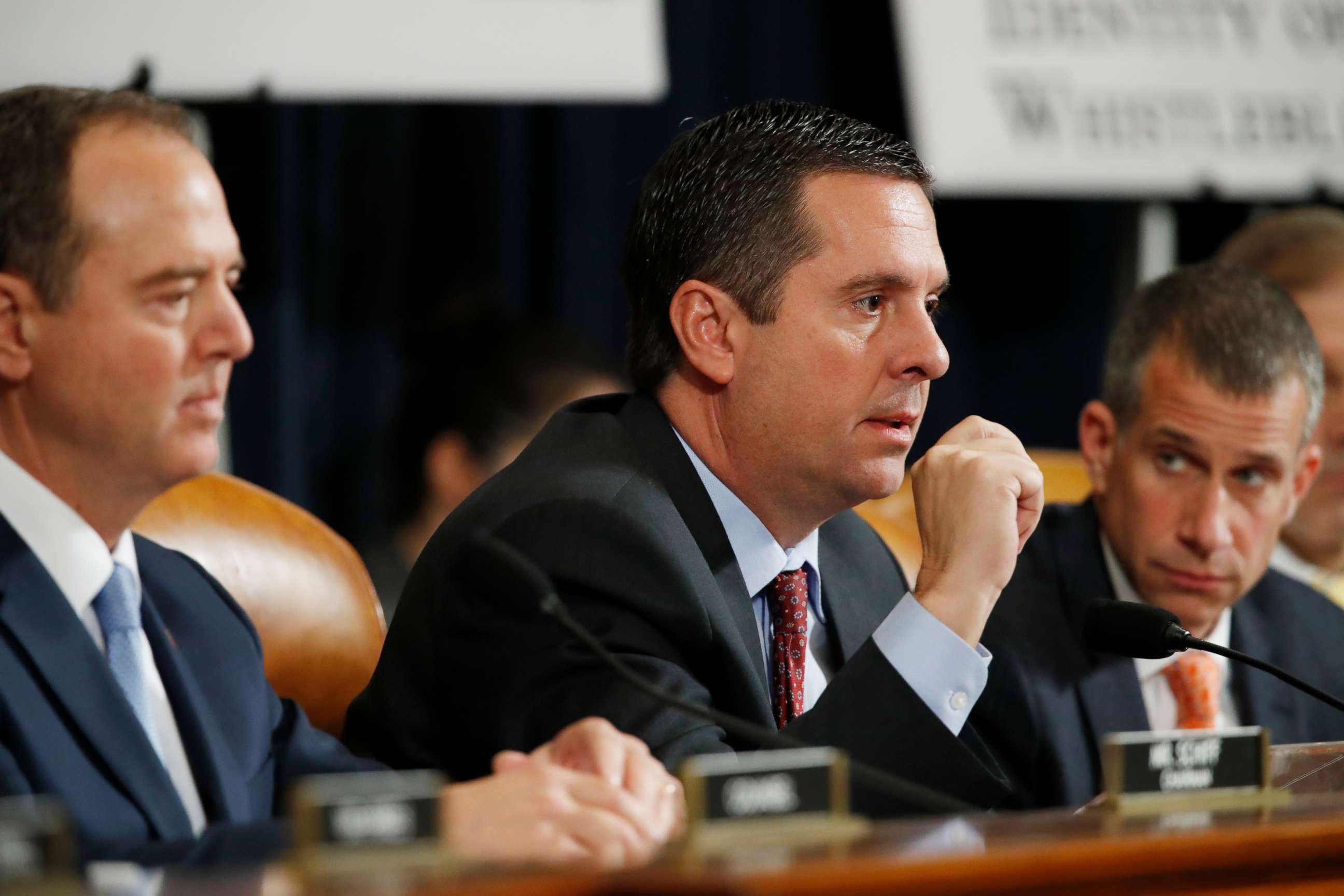
Members of the audience stood up to clap and cheer for Yovanovitch as she left the hearing room.
3:10 p.m.
President Trump denied that his tweets about Marie Yovanovitch amounted to witness intimidation, defending his right to freedom of speech.
“I don’t think so at all,” Trump said when asked if he thinks his words could be seen as intimidating.
The president at first tried to ignore the question from reporter April Ryan, telling her repeatedly to be “quiet,” before eventually answering.
In an exchange with Jon Karl, the visibly frustrated president sought to divert the focus back to Adam Schiff and defended his first amendment rights.
“I’ll you about what tampering is. Tampering is when a guy like ‘Shifty Schiff’ doesn’t let us have lawyers. Tampering is when Schiff doesn’t have witnesses, doesn’t let us speak,” Trump said.
“I have the right to speak, I have freedom of speech, just as other people do,” he said.
Trump also acknowledged to Jon that he has watched part of today’s hearing and decried the hearings as a “disgrace” and unfair to Republicans.
“I’ve been watching today, for the first time, I started watching and it’s really sad when you see people not allowed to ask questions," Trump said. "Nobody’s ever had such horrible due process, there was no due process. And I think it’s considered a joke, all over Washington and all over the world.”
2:15 p.m.
Rep. Elise Stefanik, R-N.Y., is now using most of her five-minute round of questioning to read into the record various quotes from Schiff talking about the whistleblower testifying.
"We want to make sure whistleblowers can come forward but the fact that we can criticized by Rep. Adam Schiff ... shows the duplicity and just the abuse of power that we begin to see."
She turned over 90 seconds to Rep. Jim Jordan to attack Democrats for not releasing all the deposition transcripts.
Schiff stared straight ahead with a placid expression, looking at the countdown clock.
Rep. Eric Swalwell, D-California, is now defending the whistleblower's right to safety, and accusing Republicans of working with Trump to endanger the official.
2:01 p.m.
As of 2 p.m. there's about an hour left in the hearing, with 14 members left to question Yovanovitch in addition to closing remarks from Schiff and Nunes.
The committee is expected to move into a closed session to interview David Holmes -- the staffer Taylor referenced in his testimony -- as soon as this hearing concludes.

1:56 p.m.
ABC News' Devin Dwyer notes that the president's tweets about Yovanovitch have made an impact on the hearing as it goes into the afternoon.
"If there was any doubt how damaging Republicans believe the president’s real-time tweet attack on Yovanovitch could be, just listen to them lavish her with empathy and gratitude one by one," he said in analysis on FiveThirtyEight.com.
Yovanavitch also questioned the president's broader comments about her in response to Republican Rep. Brad Wenstrup of Ohio who repeated questions from multiple Republicans about whether the president has the right to appoint and remove ambassadors as he wishes.
"What I'd like to say is, while I obviously don't dispute that the president has the right to withdraw an ambassador at any time for any reason, but what I do wonder is why it was necessary to smear my reputation, falsely?" Yovanovitch said.
1:32 p.m.
Rep. Devin Nunes, R-California, in a quick exchange, pointed out that Yovanovitch served at the president's discretion -- which the ambassador didn't dispute.
“Are you against political appointed ambassadors? Is it not the president's prerogative to appoint whoever he wants in any country?” Nunes asked.
“First of all, I am not against political ambassadors. Just to be clear,” Yovanovitch responded.
“I just wanted to clear that up,” he said.
In the next round, Rep. Jim Himes, D-Conn, pushed back, again questioning the circumstances, and suggesting she was removed because she stood in the way of the investigations POTUS sought.
"Now, it's the president's defense, and it's emerging from my Republican colleagues today, that this is all okay. Because as the president so mem -- memorably put it in his tweet today, it is a U.S. President's absolute right to appoint ambassadors,” Himes said. “I'm a little troubled by this idea of an absolute right, because that doesn't feel to me like the system of government we have here. I think that how and why we exercise our powers and rights matters."
Before the end of the GOP round, Rep. Mike Turner, R-Ohio, again returned to the whistleblower, submitting more than half a dozen articles into the congressional record of the hearing quoting Schiff comments about the whistleblower testifying earlier this fall.
1:28 p.m.
White House Press Secretary Stephanie Grisham defended the president's tweet about Yovanovitch during the hearing, saying it was not witness intimidation.
“The tweet was not witness intimidation, it was simply the President’s opinion, which he is entitled to," she said in a statement. "This is not a trial, it is a partisan political process - or to put it more accurately, a totally illegitimate, charade stacked against the President. There is less due process in this hearing than any such event in the history of our country. It’s a true disgrace.”
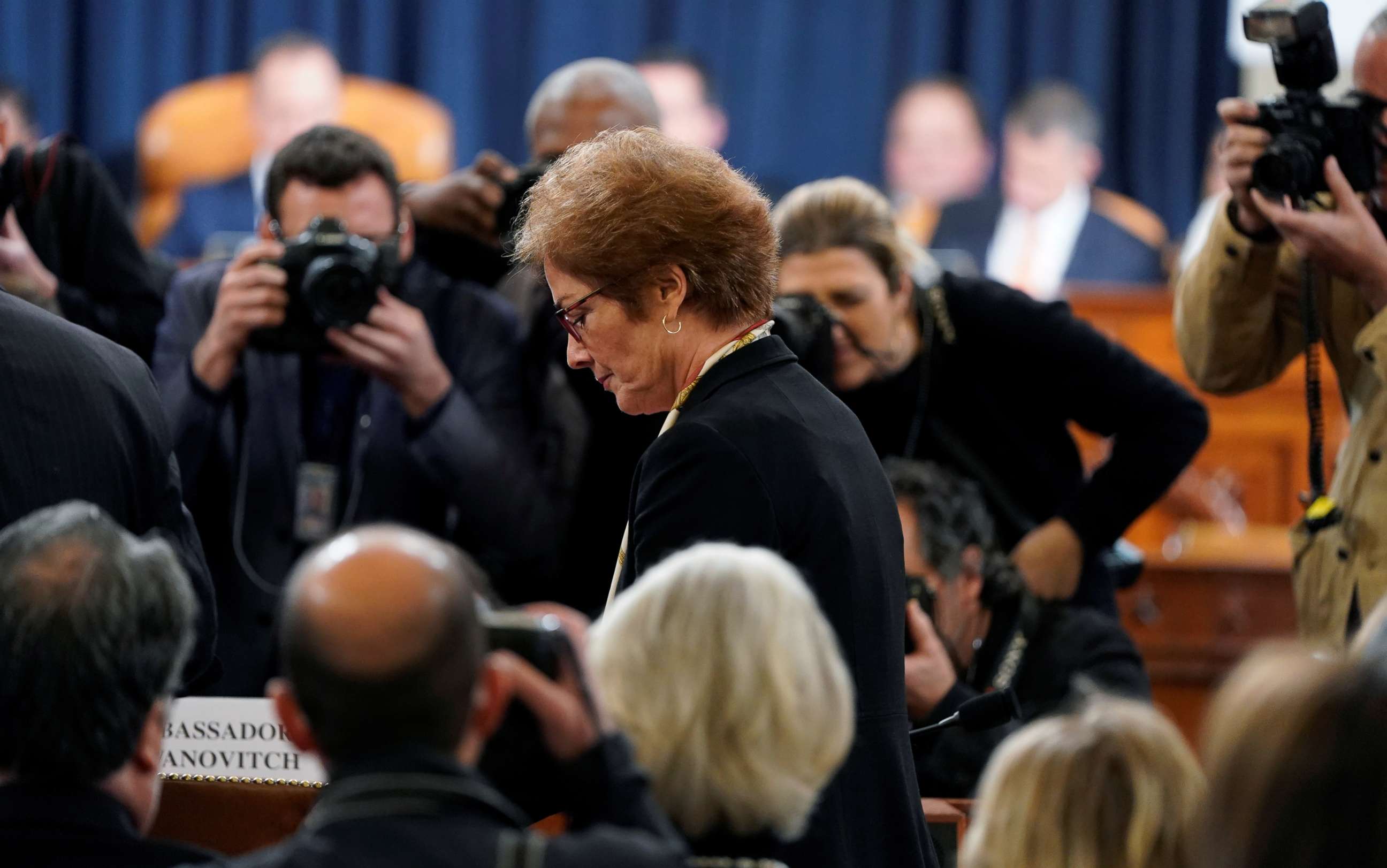
Yovanovitch said it's been a "very, very difficult time" since leaving her post in Ukraine and has faced attacks against her. She said she's generally a private person and declined to address how the situation has impacted her family.
"In my line of work, perhaps in your line of work as well, all we have is our reputation. So this has been a very painful period," she said.
1:18 p.m.
Castor asked Yovanovitch about a posts from a Ukrainian minister critical of Trump.
Republicans have repeatedly mentioned this post from Arsen Avakov, to help explain why Trump may have felt hostile towards Ukraine.
Avakov also happens to be the official who told Yovanovitch to watch her back and look out for Rudy Giuliani and his Ukrainian-American associates, per her October testimony.
Yovanovitch, in her response to Castor, seemed to make note of Trump's aggressive tweet this morning - prompting laughter from Democrats and the audience.
"Looking back on his comments in hindsight, do you see how that might create a perception that a very influential Ukranian was, was, you know, advocating against then-candidate Trump?" Castor asked.
"That he was doing what? I'm sorry?," Yovanovitch responded.
"Just advocating that was out to get him. I mean, he was, he was -- He said some real nasty things," Castor said.
"Well, you know, sometimes that happens on social media," she responded.
1:01 p.m.
The hearing room erupted in laughter when Yovanovitch was asked about a Ukrainian official who had said "nasty" things about Trump.
The Republican counsel was trying to substantiate President Donald Trump's belief that Ukraine tried to undermine his election efforts in 2016.Yovanovitch said "Well, you know, sometimes that happens on social media."
Trump had tweeted at Yovanovitch earlier, something she described as "intimidating."
On whether Ukraine opposed Trump, Yovanovitch testified that it's true some Ukrainian officials have criticized Trump, but she referred to those as "isolated incidents" and said she did not believe there was a coordinated effort on par with Russia. Yovanovitch pointed to U.S. intelligence, which found Russia's government aggressively tried to sway voters in favor of Trump.
According to other witnesses, Trump frequently spoke about Ukraine in unfavorable terms because they said he believed the government orchestrated an effort against him in the 2016 election.
Yovanovitch said she would not have recommended an investigation into Hunter Biden had she remained Ukraine ambassador.
12:41 p.m.
GOP counsel Steve Castor is now questioning Yovanovitch, in an extended 45-minute round of questioning.
Before he began, Rep. Devin Nunes tried to delegate his time to Rep. Elise Stefanik, R-N.Y. Schiff stopped him: Under the resolution passed by the House several weeks ago, only committee counsel and Schiff and Nunes are allowed to participate in the extended 45-minute round of questioning.
Stefanik is making the case that President Donald Trump's desire to investigate Hunter Biden's work on a Ukraine gas company was fair game because even the Obama administration raised concerns about the appearance of a conflict of interest.
She is referencing a warning in 2015 by the State Department's George Kent warned that Hunter Biden's work could be seen as a conflict because his father, Joe Biden, was vice president and working on Ukraine issues. No evidence has been surfaced of wrongdoing.
Stefanik says "for the millions of Americans watching," Obama's own State Department was "so concerned" that they raised the issue while preparing Yovanovitch for her Senate confirmation.
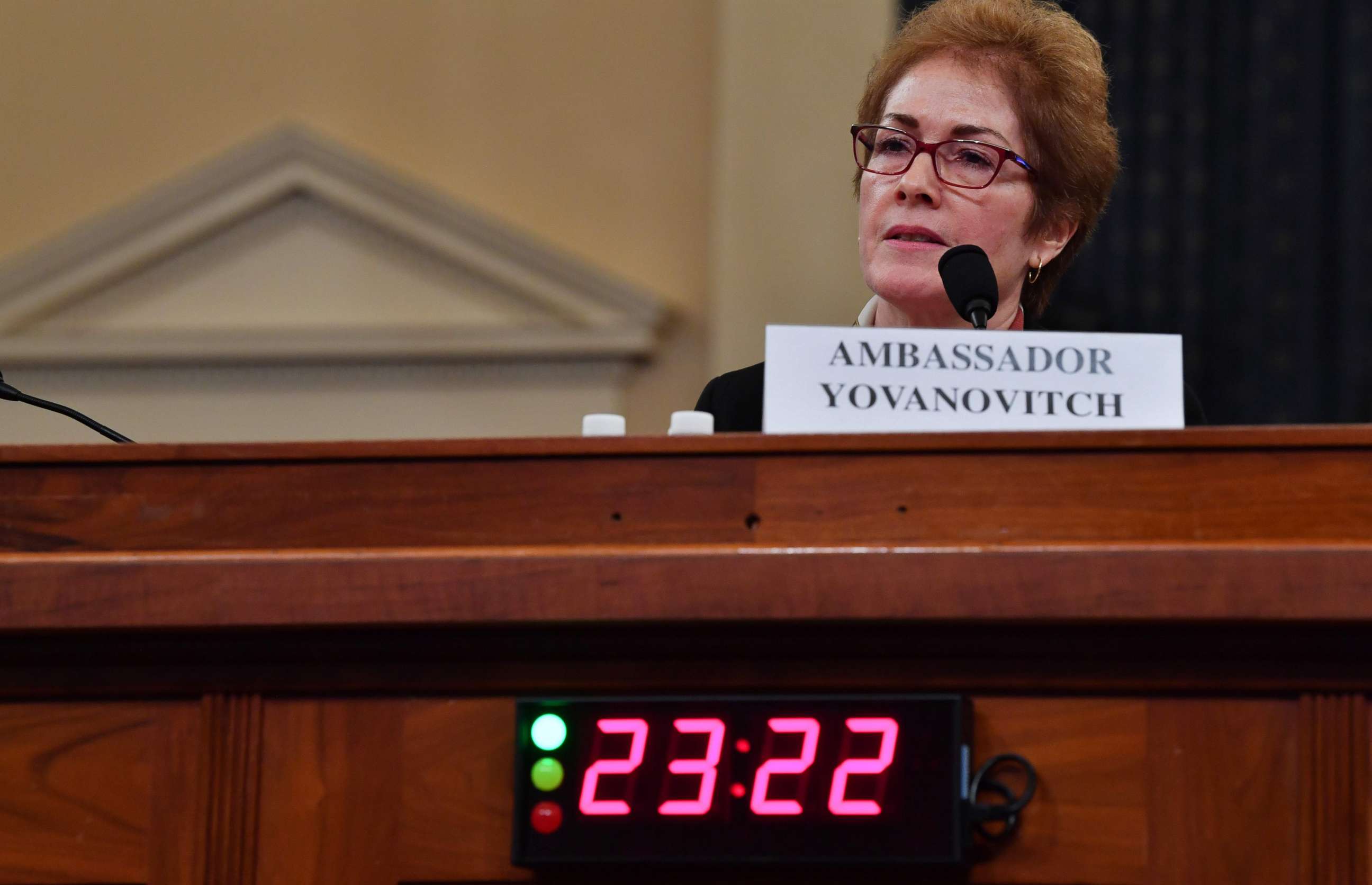
According to the rules for the impeachment inquiry approved in a full House vote several weeks ago, the chairman and ranking member can delegate part of their 45 minutes to counsel, but not other members. After the 45-minute rounds each member of the committee has 5 minutes for questions.
Despite those rules, Republicans immediately seized on Schiff's actions, as they continue to criticize the process of these hearings put forward by Democrats.As Republicans are now attempting to play up this exchange on social media – ABC News’ Benjamin Siegel reports dozens of Republicans, including Stefanik and the RNC, are tweeting about it. A senior aide to Speaker Pelosi is calling them out for the "disingenuous stunt."
One GOP aide appeared to equate it with the infamous Warren-McConnell exchange on the Senate floor in 2017, when the majority leader appeared to shut down the senator. It became a viral moment for Warren that she continues to reference on the 2020 trail, ABC News' Benjamin Siegel reports.
12:40 p.m.
Yovanovitch testified that she had never met Rudy Giuliani associates Lev Parnas and Igor Fruman but understood that they were working with Giuliani to try to remove her from her post.
Parnas and Fruman were trying to create new business opportunities in exporting liquified natural gas to Ukraine when the two were arrested. They have been charged with campaign finance violations in the Southern District of New York. Both men have pleaded not guilty and prosecutors say the case remains under investigation.
Yovanovitch said it was "unclear" to her why they wanted her removed. She also said it was unusual that the two never went to the embassy to seek assistance and "get the lay of the land."
12:21 p.m.
At 12:21 p.m. Schiff gaveled the hearing back into order. Republicans and Ranking Member Devin Nunes now have 45 minutes for questions.
Republican Devin Nunes is thanking Yovanovitch for her "performance" and noting she doesn't have first-hand knowledge of the allegations central to the impeachment inquiry.Yovanovitch had already been ordered to leave Ukraine prior to several key events, including the White House order in July to freeze on military aid and Trump's July 25 phone call with Ukraine's president in which he asked for a "favor" and pressed Ukraine to investigate the Bidens.
The Republican counsel, Steve Castor, is opening his line of questioning of Yovanovitch by thanking her for her service and recognizing her 33 years of service.
12:20 p.m.
With Democrats decrying the president's tweets this morning as "witness intimidation," make note of the fact that a jury situated between the White House and the Capitol just determined one of the president's oldest friends, Roger Stone, did just that, ABC News' Lucien Bruggeman says.
One of the seven counts for which Stone was just found guilty was witness intimidation. The charge is based on his efforts to "attempt to corruptly persuade another person" subpoenaed to testify before a congressional committee...
11:23 a.m.
ABC News' George Stephanopoulos says that based on his experience working in the White House during the conflict in Mogadishu, Somalia "the idea that "somehow a junior foreign service officer could have anything to do with the situation in that country is beyond absurd."
ABC News has asked Yovanovitch's lawyers to confirm her role at the U.S. embassy in Mogadishu and the exact dates.
But as her first tour of duty as a Foreign Service officer, it's very likely that she was a consular officer - processing visa and passport applications and providing other consular services, like repatriation of an American's remains or visiting imprisoned Americans.
To blame her for the violence, famine, and chaos in Somalia is absurd, but especially because she would have likely have been in this kind of role, ABC News' State Department reporter Conor Finnegan says in an analysis.
Yovanovitch started in the Foreign Service in 1986, she likely had a year of language training before heading out - meaning she likely would've been there from 1987 to 1989 or so.
Somalia's civil war began in 1991, but there were violent guerrilla attacks by competing opposition groups during the 1980's against the ruling military junta. When the junta collapsed in 1991, those opposition groups turned on each other. Amid that civil war, there was a severe famine -- leading George HW Bush to send in US Marines in 1992, but they were withdrawn by Bill Clinton in 1993 after militias shot down two Black Hawk helicopters - with the US officially closing its embassy* in 1994.
That embassy reopened last December -- with a career Foreign Service officer as the first U.S. ambassador in Mogadishu in decades -- and other brave Foreign Service officers staffing the new embassy despite the ongoing violence and the threat of terror attacks by al Shabaab.
11:08 a.m.
Two of President Trump's strongest GOP defenders in the House downplayed the impact of the president's Twitter attack against Yovanovitch, ABC News' Ben Siegel reports from outside the hearing room.
"I don't think it's going to influence anyone in any particular fashion," Rep. Mark Meadows, R-North Carolina, told ABC News. "We're hearing about her time that was prior to holding up the aid ... to suggest that there's a whole lot of relevant testimony as it relates to the impeachable offenses that Democrats have alleged, I don't see it being relevant."
Rep. Lee Zeldin, R-New York, instead criticized Adam Schiff, accusing him of theatrics and cherry-picking the first part of Trump's tweet without showing Yovanovitch the second half.
"Adam Schiff can't help himself, he didn't read the entire tweet," he said. "He will cherry-pick out to a witness who hasn't read it, who doesn't have it in front of them."Zeldin wouldn't say whether Trump's broadside was constructive, or whether it helped the GOP case this morning in the hearing.
"The president is going to defend himself. It doesn't matter what Bill Clinton and his advice is," he said.
Asked if he thought Yovanovitch was a bad ambassador, he declined to say. "Personally, I'm not an expert on every single assignment, and every last fact her time in each of those countries to be able to answer."
10:44 a.m.
ABC News’ Rick Klein notes that Trump could have hurt his case by tweeting about Yovanovitch in the middle of her testimony.
“It seems to me that Trump did about the worst thing he could have done for himself by tweeting an attack on Yovanovitch in the middle of the hearing. Reminds me of all the advice he got to not attack Mueller… only to attack Mueller, over and over and over and over,” he says.
ABC News’ Mary Bruce notes that Republicans have so far avoided personal attacks against Yovanovitch, in part because of the past attacks targeting her.
10:36 a.m.
At 10:36 a.m. the committee began a recess for votes in the House. The break is expected to last about an hour.
10:35 a.m.
In a September tweet, Trump wrote that Biden demanded "the Ukrainian Government fire a prosecutor who was investigating his son, or they won't get a very large amount of U.S. money."
ABC News' Mike Levine at the time reported that this accusation is misleading, as there was widespread and global criticism of the Ukrainian prosecutor general at the time. In other words, there were grounds for Biden to urge his dismissal that had nothing to do with his son. Several high-profile Western leaders have said Biden's recommendation was prudent.
According to testimony by U.S. envoy Kurt Volker and others, Biden’s position was backed by other international powers that agreed that Viktor Shokin was ignoring corruption and needed to go.
10:27 a.m.
Schiff is allowing Yovanovitch to respond to Trump's tweets. He is reading the president's tweets out loud.
"Would you like to respond to the president's attack that everywhere you went 'turned bad?'"
"I don't think I have such powers," she said, adding that where she's been she believes she's made the places she's been "demonstrably better.""demonstrably better."
"It's very intimidating."
Schiff responded by saying "I want you to know, ambassador, that some of us here take witness intimidation very seriously."
10:25 a.m.
ABC News’ Rick Klein is offering analysis for ABC News partner FiveThirtyEight. A lot of time is being spent discussing Yovanovitch’s personal reaction to the events, he notes.
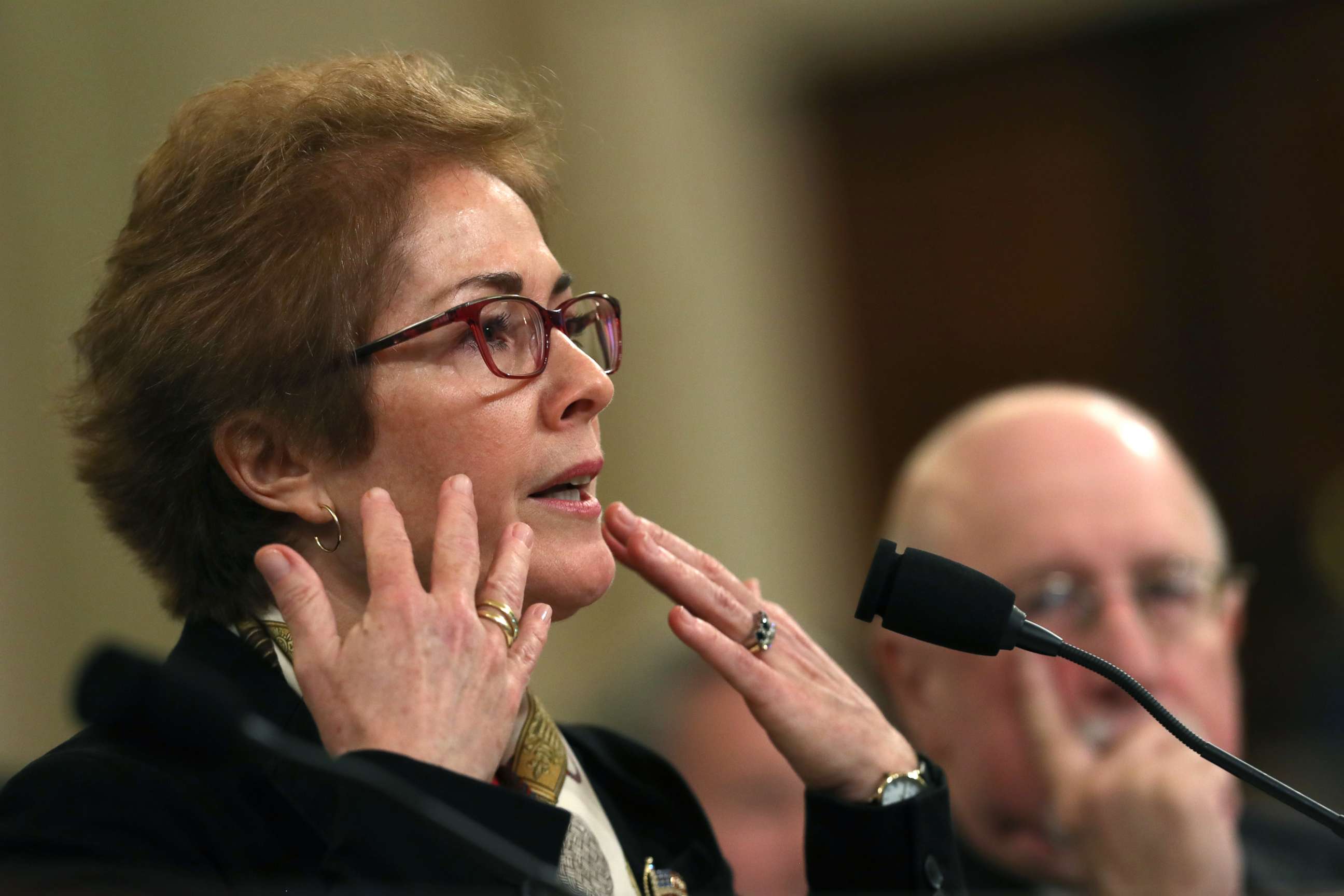
“I get that Yovanovitch is a compelling witness for Democrats. But I wonder why they are spending so much time talking about her feelings today. You can’t impeach a president for hurting people’s feelings, even really talented and critical ambassadors,” Klein says.
ABC News’ Mary Bruce and Ben Siegel point out that Nunes did not directly mention her in his opening statement and that Yovanovitch could be a sympathetic witness for Democrats.
“To state the obvious, this attack from the president is the opposite of how Republicans wanted to play this,” Bruce notes.
“They have been hesitant to go after Yovanovitch personally. And after her strong opening statement, it's clear why they would not want to go after her prior work or character.
10:24 a.m.
Yovanovitch says it's not true she was "bad-mouthing" Trump and that she was rattled by false accusations in conservative media outlets that she was protecting corruption in Ukraine.
"These attacks were being repeated by the president himself and his son," Donald Trump Jr., she said.
Her concern was that her authority in Ukraine was being undercut. She said she went to her superiors at the State Department asking that they defend her.
She says she never heard concerns from the State Department about her job performance. But that a statement of support was never issued because of fear that Trump would undermine it in a tweet.
10:23 a.m.
Yovanovitch said she was “shocked and devastated” when she learned Trump called her “bad news” on the July 25 call with Ukrainian President Zelenskiy.
“It was a terrible moment,” when she learned about the call, she said. “A person who saw me actually reading the transcript said that the color drained from my face, I think I even had a physical reaction. I -- I think, you know, even now words kind of fail me.”
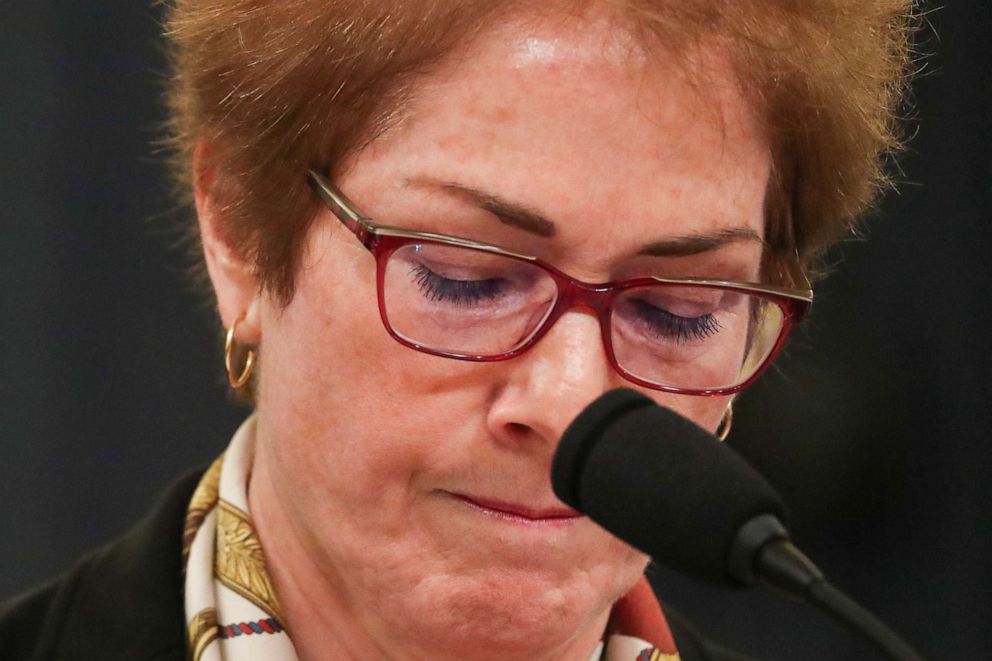
She also said she saw it as a vague threat when Trump said she "would go through some things."
10:09 a.m.
Trump is now tweeting attacks on Yovanovitch blaming her for awful world events in places she was stationed.
ABC News’ Katherine Faulders points out that his tweet includes inaccurate claims that Ukranian president Zelenskiy apoke unfavorably about Yovanovitch in their call on July 25. Trump was the one on the call that called the ambassador “bad news.”
10:06 a.m.
Yovanovitch is describing the moment she learned she was being recalled from Ukraine, given the reason that the president "has lost confidence in you."Shaking her head, she said, "that was, you know, a terrible thing to hear."
She also was told that Secretary of State Mike Pompeo could no longer "protect her." She repeated the feeling that it was "terrible.""It was not the way I wanted my career to end," she told the committee.
10:03 a.m.
Yovanovitch is testifying that President Donald Trump's lawyer, Rudy Giuliani, openly embraced people inside Ukraine known to be corrupt.
One of those people is Yuriy Lutsenko, a former Ukrainian prosecutor whom the State Department has accused of having a role in the manufacture of fake passports.
When asked if Lutsenko was among those who "coordinated" with Giuliani to "peddle false accusations against you as well as the Bidens," Yovanovitch said "yes, that's my understanding."
9:50 a.m.
Yovanovitch agreed her ouster could create a chilling effect for other ambassadors seeking to address corruption around the world.
“Is it fair to say that other ambassadors and others of lesser rank who served the united States and embassies around the world might look at this and think if I take on corrupt people in these countries that could happen to me?” Schiff asked.
“I think that's a fair statement, yes,” Yovanovitch responded.
ABC News’ congressional correspondent Mary Bruce highlights that in the midst of her powerful personal story, Yovanovitch is delivering a harsh message to Secretary of State Pompeo, who of course refused to stand up for her, despite the urging of his own top aide.
"The State Department is being hollowed out from within at a competitive and complex time on the world stage. This is not a time to undercut our diplomats. It is the responsibility of the department's leaders to stand up for the institution and the individuals who make that institution still today the most effective diplomatic force in the world,” Yovanovitch said.
9:44 a.m.
Yovanovitch says she had only three contacts with Rudy Giuliani, who joined the president's legal team in mid April 2018. "I do not understand Mr. Giuliani's motives for attacking me, not can I offer an opinion on whether he believed the allegations he spread about me."
NEW: Marie Yovanovitch: "Ukrainians who preferred to play by the old, corrupt rules sought to remove me. What continues to amaze me is that they found Americans willing to partner with them and...they apparently succeeded in orchestrating the removal of a U.S. Ambassador." pic.twitter.com/bzctifeXnn
— Evan McMurry (@evanmcmurry) November 15, 2019
Yovanovitch says attacks on civil servants is leading to a crisis within the State Department.
“This is not a time to undercut our diplomats,” she said when discussing how unfilled positions and low morale impacts their work on foreign policy.
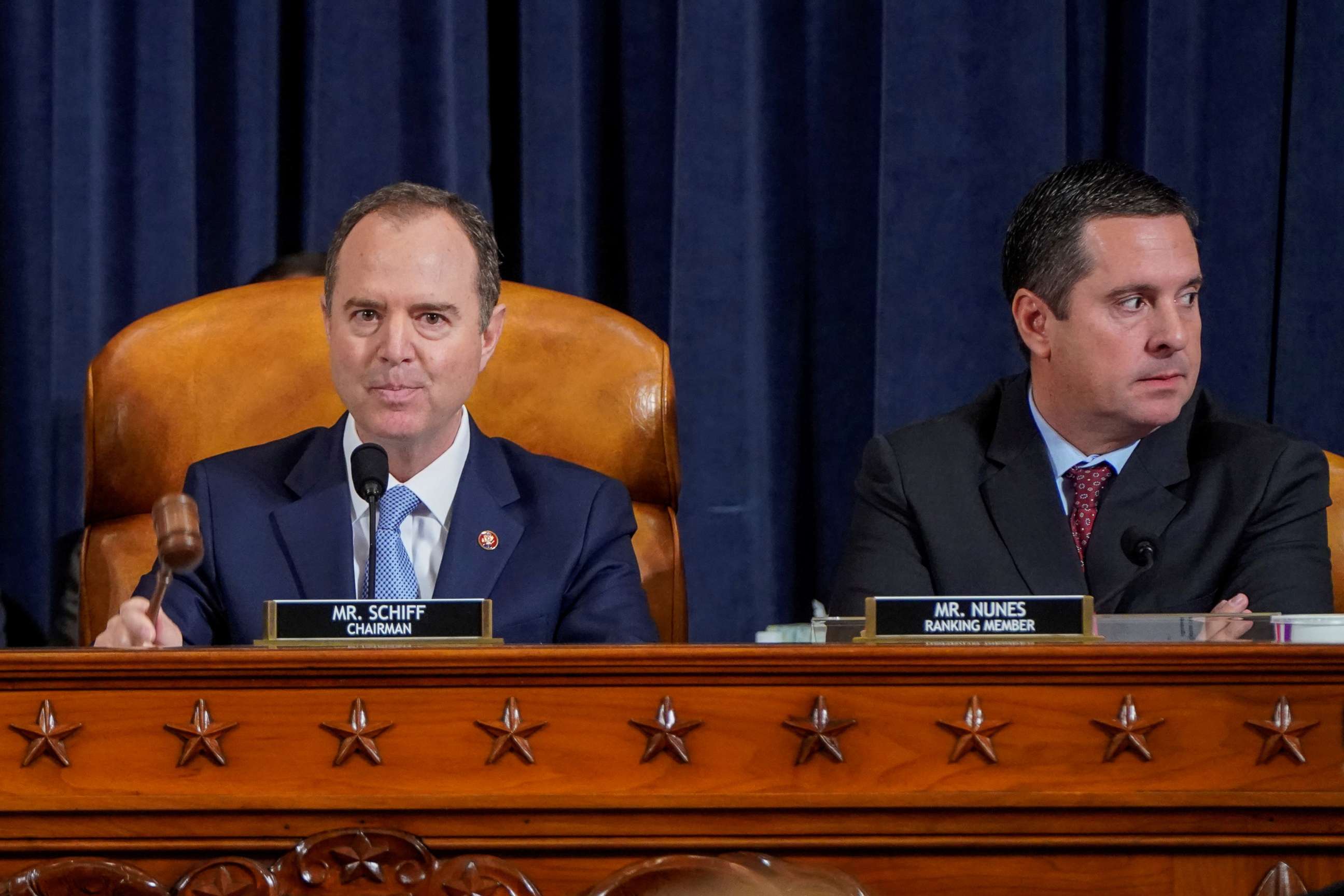
9:42 a.m.
Yovanovitch says corrupt individuals oversees found "Americans willing to partner with them." And she is denying that she ever delivered a "do not prosecute" list to Ukraine's former prosecutor.In her opening statement she said U.S. "anti-corruption efforts got in the way of a desire for profit or power," and "Ukrainians who preferred to play by the old, corrupt rules sought to remove me."
"What continues to amaze me is that they found Americans willing to partner with them and, working together, they apparently succeeded in orchestrating the removal of a U.S. Ambassador. How could our system fail like this? How is it that foreign corrupt interests could manipulate our government?"
She says she doesn't understand Giuliani's motives for attacking her but believed they were "suspect" and came from people with "questionable motives."
9:35 a.m.
Ambassador Marie “Masha” Yovanovitch is recalling the hardships of serving as a U.S. diplomat in foreign countries whose governments are often faltering and in situations are dangerous. On Ukraine, she is describing going to its “front line” multiple times “to show the American flag” and witness first hand the country’s attempts to fend off Russian aggression.
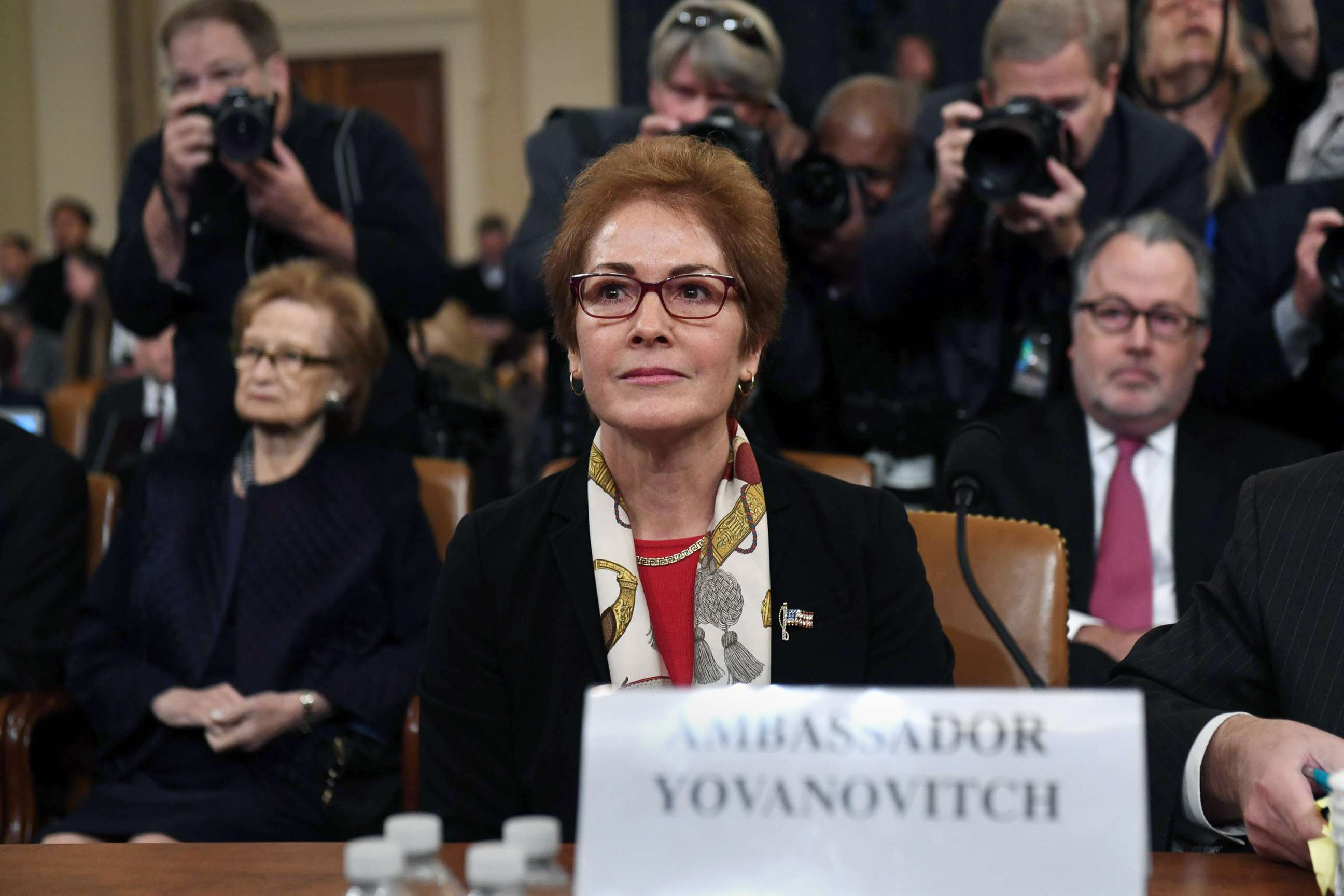
“The U.S. is the most powerful country in the history of the world, in large part because of our values,” she says.
"The history is not written yet, but Ukraine could move out of Russia's orbit," she said.
9:33 a.m.
In her opening statement Ambassador Marie “Masha” Yovanovitch shared multiple times she worked in difficult posts as a Foreign Service officer, including incidents when a gunman attacked an embassy where she was serving and being caught in crossfire during an attempted coup in Russia.
“It took us three tries, me without a helmet or body armor,to get into a vehicle to go to the embassy. We went because the ambassador asked us to come,” she said.
Yovanovitch said that between August 2016 and May 2019 she visited the front lines between Ukraine and Russia ten times, saying she wanted to show the American flag and see how U.S. aid was being put to use.
GOP Reps. Stefanik, Conaway and Jordan repeatedly tried to interject after the opening statement from Nunes, raising "points of order" to question Schiff's actions in the last hearing.
He parried them all -- but a much feistier beginning to today's hearing - and much more GOP focus on the process, ABC News' Benjamin Siegel reports.
9:30 a.m.
The April call between Presidents Trump and Zelenskiy is mostly congratulatory around Zelenskiy’s win, according to the rough transcript released by the White House.
Republicans may claim, based on this, that the president invited Zelensky to the White House in their first conversation - which on the surface would seem to undermine the case that a meeting was being used as leverage for investigations.
“When you’re settled in and ready, I’d like to invite you to the White House...” Trump says according to the transcript.
Multiple witnesses have testified, however, that a meeting was in fact later dangled as leverage along with aid.
White House Press Secretary Stephanie Grisham said in a statement to the pool: “The President will be watching Congressman Nunes’ opening statement, but the rest of the day he will be working hard for the American people.”
Former U.S. Amb. to Ukraine Marie Yovanovitch is sworn in ahead of her testimony at the second public impeachment hearing.
Follow along for live updates and analysis: https://t.co/5l2kdn0RWn pic.twitter.com/OF3F5KZwQH
— ABC News Politics (@ABCPolitics) November 15, 2019
9:27 a.m.
Rep. Devin Nunes, R-Calif. is recounting the president's first phone call with Ukraine's president from April 21, which the White House released as the hearing began. In that call, the two presidents exchange pleasantries and the tone is very upbeat.
That early phone call is not at the heart of the ongoing investigation. It wasn't until later that the Pentagon and State Department approved nearly $400 million in military aid and Trump's lawyer, Rudy Giuliani publicly floated an unsubstantiated theory that Ukraine -- not Russia -- meddled in the 2016 election. The military aid wasn't frozen until July, shortly before Trump's subsequent phone call to Ukraine's president.
Schiff swore in Ambassador Marie “Masha” Yovanovitch and she is giving her opening statement to the committee.
“I come before you as an American citizen who has spent the majority of my life – 33 years – to service to the country,” she says.
9:25 a.m.
Rep. Devin Nunes, R-California, is hitting many of the same notes as his opening statement on Wednesday, accusing Democrats of a maniacal focus of impeaching a "duly-elected president," and trumpeting "Second and third-hand information" of diplomats rather than the "the record" of the president's phone call.
Nunes also is reading out the transcript of the first phone call between Trump and Ukrainian President Volodymyr Zelenskiy -- which the White House happened to release as this hearing began.
9:24 a.m.
Intelligence Committee Ranking Member Devin Nunes, R-Calif. accuses Democrats of a double standard. He says they pursued the Russia investigation based on unsubstantiated foreign-based intelligence, but “ignore Ukrainian election meddling.”
“They are blind to the blaring signs of corruption,” surrounding Democrat Joe Biden’s son.
Nunes is dismissing the findings of U.S. intelligence in these statements. While some Ukrainian politicians did support Clinton over Trump in largely public ways, U.S. intelligence and a bipartisan Senate inquiry found that Russian operatives -- at the behest of their government -- engaged in a far more widespread, invasive and secretive campaign to sway voters in support of Trump.
On Biden, it is correct that Biden in 2016 pressured Ukraine to fire the prosecutor general, Viktor Shokin, and threatened to withhold nearly $1 billion in U.S. aid if Shokin wasn't removed. But according to testimony by U.S. envoy Kurt Volker and others, Biden’s position was in line with U.S. policy and backed by other international powers that agreed Shokin was ignoring corruption and needed to go.
No evidence has surfaced that Joe Biden acted to help his son, nor that his Hunter Biden violated any laws, and the Bidens deny any wrongdoing.
9:22 a.m.
ABC News' Political Director Rick Klein notes a key passage from House Intelligence Committee Chair Adam Schiff's, D-Calif opening statement: “The question before us is not whether Donald Trump could recall an American ambassador with a stellar reputation for fighting corruption in Ukraine, but why would he want to?” The issue with that, though, is Republicans would argue it doesn’t matter, Klein says. He’s president, and gets to do things like this as he likes.
9:14 a.m.
Intelligence Committee Ranking Member Devin Nunes, R-Calif. criticized the hearings as “TV spectacles” in his opening statement, continuing Republican arguments that the impeachment inquiry is a distraction from other issues.
He said Democrats had already decided to impeach President Donald Trump before concerns about his July 25 call with Ukranian President Zelenskiy surfaced, saying they’re trying to fulfill their “Watergate fantasies.”
Nunes is accusing Democrats of trying to fulfill their "Watergate fantasies." This is a reference to the investigation of President Richard Nixon. The California Republican says their "whole case" relies on "second-hand" and "third-hand" information."
9:09 a.m.
House Intelligence Committee Chair Adam Schiff, D-Calif. began the second public hearing in the impeachment inquiry.
Schiff described Yovanovitch as an “exemplary officer” in his opening statement. Yovanovitch is expected to address the circumstances around her departure from the post amid attacks in conservative media and by Ukraine's former public prosecutor, who accused her of giving him a "do not prosecute" list and blocking him from traveling to the U.S. to investigate Democrats after she publicly criticized the country's lack of progress in tackling corruption.
This description of Yovanovitch is intentional in making the case that Trump and his lawyer, Rudy Giuliani, targeted her because she wasn't willing to play along."Why did Rudy Giuliani want her gone, and why would Trump?" Schiff asked.
Rep. Schiff said the president shouldn't use his powers to "destroy others to advance his personal or political interests."
Rep. Adam Schiff praises Marie Yovanovitch, ex-ambassador to Ukraine: "She is an exemplary officer who is widely praised and respected by her colleagues. She is known as an anti-corruption champion whose tour in Kyiv was viewed as very successful." https://t.co/APRDkqce3Q pic.twitter.com/SWyTmObHtt
— ABC News (@ABC) November 15, 2019
8:45 a.m.
Even as testimonies in Washington have filled in much of the back channel efforts to pressure Zelenskiy, Ukrainian officials have determinedly avoided contradicting Trump’s version of events.
Ukraine’s foreign minister on Thursday insisted that it has never understood the hold of the military aid was linked to Trump’s demands it investigate the Bidens, even as multiple testimonies from U.S. officials said the Ukrainians had known.
“I’ve never seen the direct link between any investigations and the military aid. Yes, the investigations were mentioned and you know it was mentioned in the phone conversation, but there was not the immediate direct link between these events,” Prystaiko told ABC News following a press conference in Kyiv.
“We didn’t discover the aid was being held up. What we discovered is that there was a review of this aid. I would say a couple of months ago. So we actually did not find that it was a very painful decision, we just waited until it was resolved.”
In reality, the standard review process he referred to had been completed months earlier. The officials who have testified have said they were baffled and alarmed by the hold on the aid by the White House because it had come after the review and there seemed to be no good reason for delaying it.
Prystaiko asserted Sondland had never told any Ukrainian officials that unlocking the aid was linked to the investigations, despite Sondland himself testifying earlier this month he had told a key advisor to Zelenskiy, Andriy Yermak, that on Sept. 1st.
“Ambassador Sondland didn’t tell us— and didn’t tell me for sure— that there is a connection between the aid and the investigations,” Prystaiko said. “You should ask him what he was recalling — I didn’t remember any of these conversations, at least not with me as minister of foreign affairs. If he had somebody else to talk to, it was not us, not official government.”
8:36 a.m.
Former U.S. Ambassador to Ukraine Marie Yovanovitch arrived on Capitol Hill ahead of her public testimony in the ongoing impeachment inquiry.
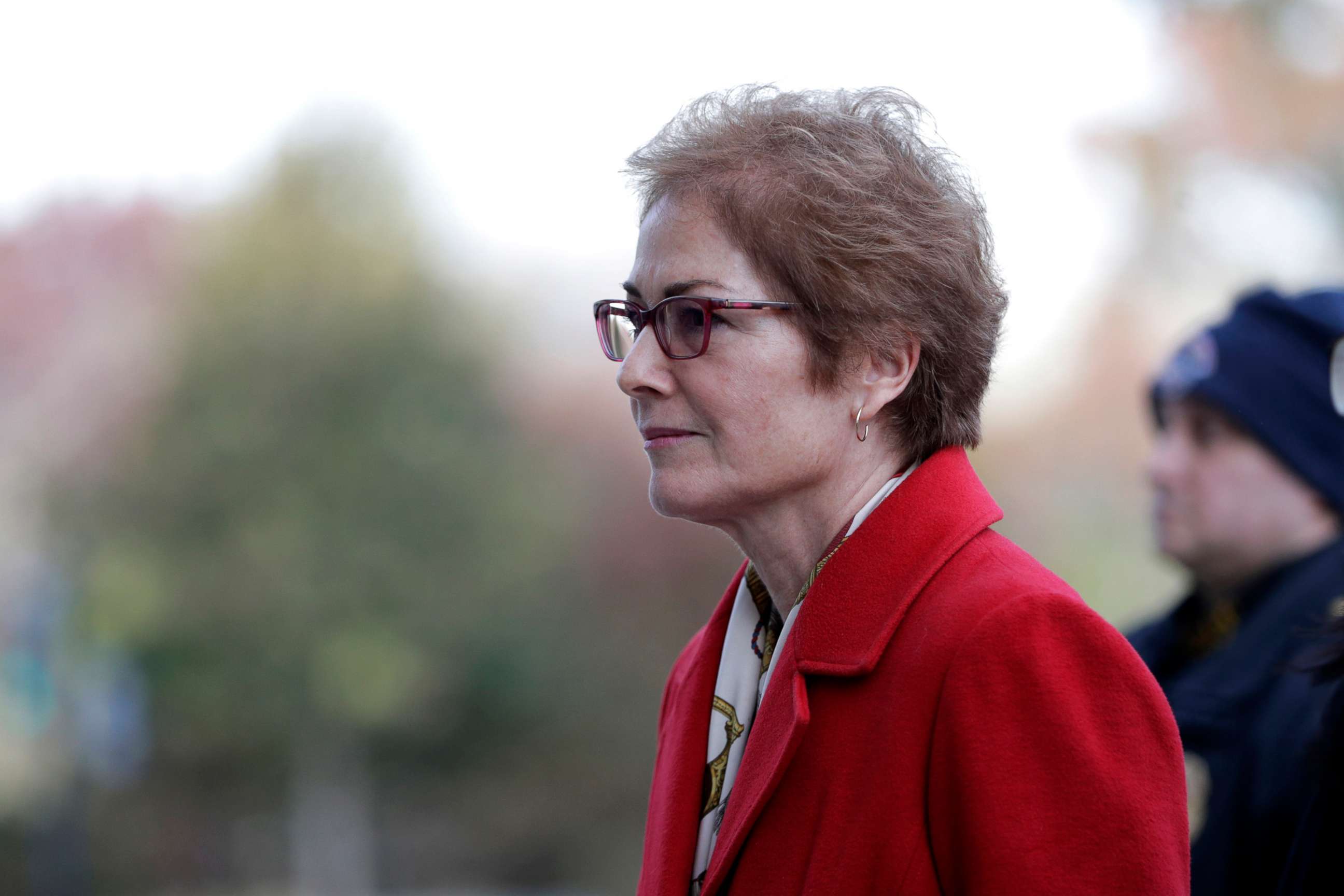
Background
House Intelligence Committee Chairman Adam Schiff, D-Calif., on Wednesday said Yovanovitch was the target of a "smear campaign" by the president's personal attorney Rudy Giuliani.
A Democratic official working on the impeachment inquiry described Yovanovitch, a veteran diplomat, as an "anti-corruption champion" who was "targeted for doing her job."
She was removed from her post before the July phone call between President Donald Trump and President Volodymyr Zelenskiy, but Democrats believe she could help highlight the efforts of Giuliani and other officials working in the "irregular" policy channel to pressure Ukraine to launch investigations into the Biden family and the 2016 election.
In her closed-door deposition, Yovanovitch, who is still a State Department employee, told lawmakers that she was targeted in a "concerted campaign," and that she had done nothing wrong in her post.
"I do not know Mr. Giuliani's motives for attacking me," she said in last month's closed-door deposition, according to a transcript of the closed-door hearing released by Democrats. "But individuals who have been named in the press as contacts of Mr. Giuliani may well have believed that their personal financial ambitions were stymied by our anti-corruption policy in Ukraine."
She also said she felt threatened after Trump mentioned her in the July phone call with Ukraine's leader -- telling Zelenskiy that she was "bad news" and was "going to go through some things."
"I didn't know what it meant," she said, according to the transcript of her testimony. "I was very concerned. I still am."
Yovanovitch told investigators she was informed that the State Department would not issue a statement defending her because of concerns it would be undermined by the White House.
"I was told there was caution about any kind of statement, because it could be undermined," she told lawmakers.
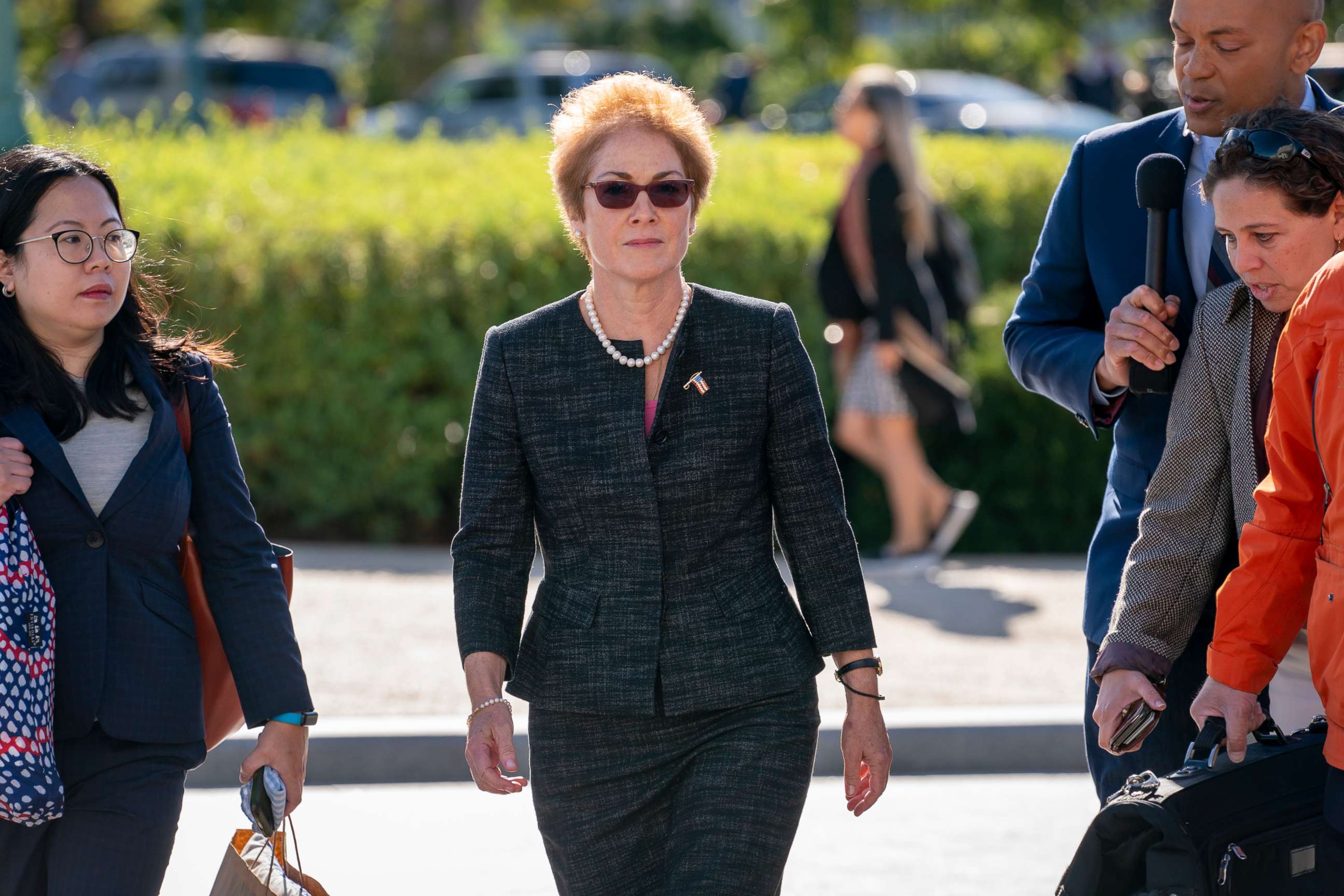
Several of Yovanovitch's former colleagues have vouched for her in both public and private impeachment depositions and hearings.
Michael McKinley, a former adviser to Secretary of State Mike Pompeo and a career diplomat, told House investigators in a closed session on Oct. 16 that he resigned because of the State Department's unwillingness to defend career diplomats.
He also told lawmakers under oath he that approached Pompeo repeatedly to raise concerns about the lack of support for Yovanovitch and did not get a response.
"From the time that Ambassador Yovanovitch departed Ukraine until the time that he came to tell me that he was departing, I never heard him say a single thing about his concerns with respect to the decision that was made," Pompeo said in an appearance on ABC's "This Week" on Oct. 20. "Not once, George, did Ambassador McKinley say something to me during that entire time period."
Republicans have defended the removal of Yovanovitch, arguing that Trump was well within his rights as president to assign and remove U.S. ambassadors from overseas posts.
Rep. John Ratcliffe, R-Texas, a member of the House Intelligence Committee, said in Wednesday's hearing that Trump "very clearly has the constitutional authority" to hire and fire ambassadors.
"Most everybody apparently understands that, but it doesn't include House Democrats," he said.
Yovanovitch appears on the Hill after the release of a new report from the State Department inspector general on retaliation against career officials.
The report from the independent watchdog on Thursday found that senior agency officials appointed by Trump retaliated against a career employee because of her perceived national origin and political views, based off allegations in a conservative media article.
